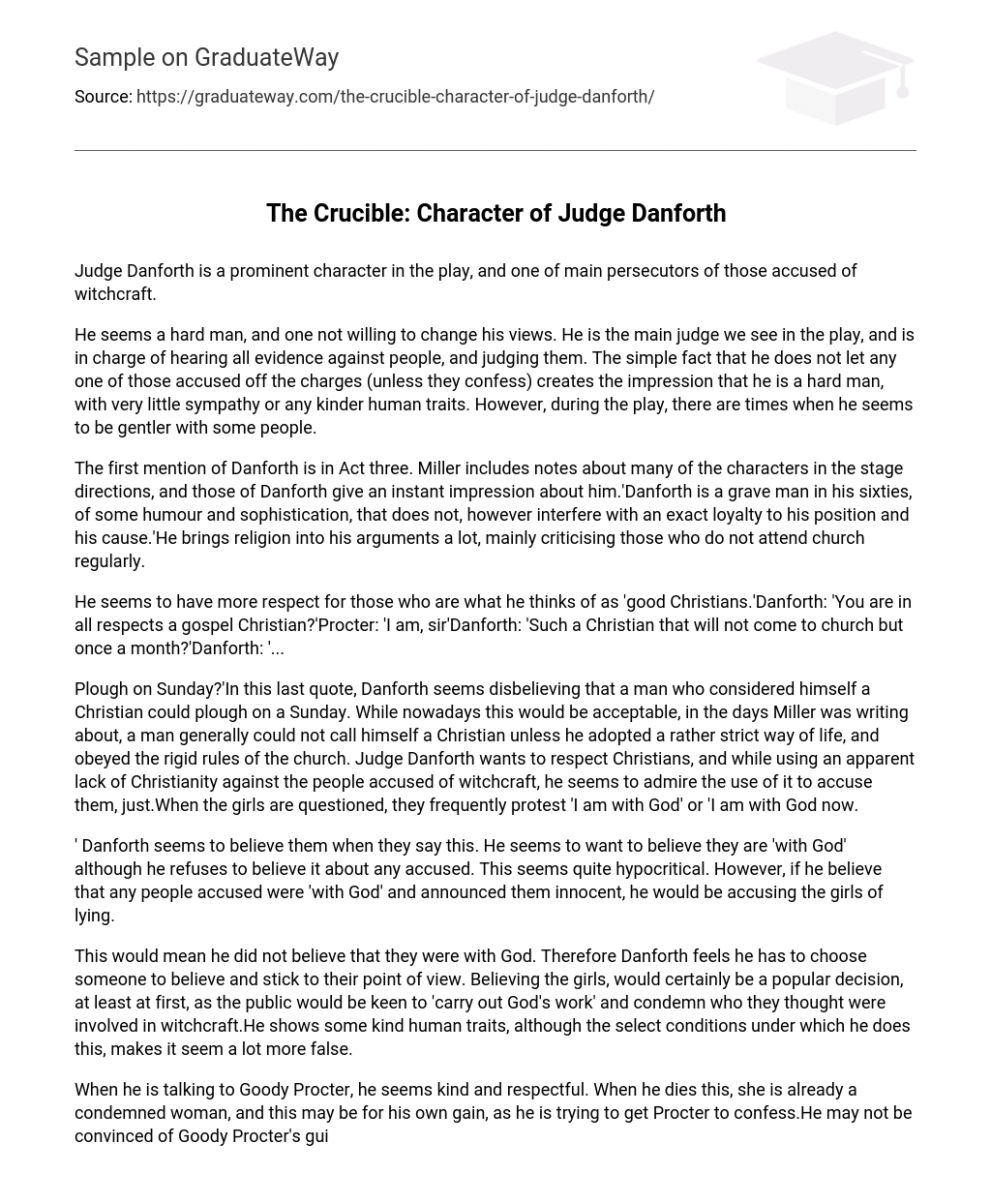Judge Danforth plays a crucial role in the play as one of the main individuals responsible for persecuting those accused of witchcraft.
Throughout the play, he displays an unyielding nature and a reluctance to alter his convictions. Serving as the primary judge, he assumes the crucial role of evaluating all evidence and rendering decisions. His rigid stance on not exonerating individuals (unless they confess) reveals a stern disposition devoid of empathy or compassion. Nevertheless, there are instances in which he exhibits benevolence towards certain individuals.
In Act three, the first mention of Danforth is made by Miller in the stage directions. These directions provide insight into Danforth’s character, describing him as a serious man in his sixties with a touch of wit and refinement. However, this does not hinder his unwavering loyalty to his role and beliefs. Danforth frequently incorporates religion into his arguments, often reprimanding those who do not regularly attend church.
It seems that he holds a higher regard for individuals whom he deems as ‘good Christians.’ Danforth asks, “Do you truly embody the essence of being a devout Christian?” Proctor responds with confidence, “Yes, sir.” Danforth challenges him further, asking, “A Christian who only goes to church once a month?” Danforth then continues…
Danforth expresses doubt that a self-proclaimed Christian would engage in ploughing on a Sunday. In Miller’s time, it was not typical for someone to claim Christianity unless they lived a strict lifestyle and followed the church’s strict rules. Judge Danforth desires to show respect towards Christians, but paradoxically uses the accused individuals’ perceived lack of Christianity as evidence against them. Surprisingly, he appears to appreciate the manipulation of religion to accuse others. When interrogated, the girls often assert their connection with God.
Danforth appears to trust and accept the claims made by these individuals. He demonstrates a desire to believe that they are aligned with God, even though he does not believe the same for any of the accused. This contradiction can be seen as hypocritical. However, if he were to believe that any of the accused were indeed ‘with God’ and declared them innocent, he would essentially be accusing the girls of falsehood.
Danforth feels the need to choose who he believes and support in this matter. If he believes the girls, it would be a popular decision initially because the public would be eager to condemn those they suspect of witchcraft in order to do God’s work. Despite showing some human traits, his actions under specific circumstances seem insincere.
When conversing with Goody Procter, he appears kind and respectful. However, she is already a condemned woman at this point, and it is possible that he does so for his own benefit, as he attempts to elicit a confession from Procter. It is possible that he is not convinced of Goody Procter’s guilt, which connects to another recurring theme associated with Danforth – pride. Clearly, Danforth possesses a great deal of pride.
He has a strong belief in his personal power and considers himself a devout Christian. He views any criticism of the court as a personal attack on himself. Moreover, he refuses to entertain any defense from those accused, perceiving it as an assault or an indication of witchcraft by the defender. However, when Mary Warren questions the validity of the accusations, he pays attention and likely starts questioning the charges against Goody Procter, and later, Procter.
He refuses to reverse any decisions he has made previously, as doing so would contradict his previous judgments and betray a sense of vulnerability. He believes it would be unjust to absolve individuals of charges for which others have already been punished. Though this mindset reflects a strong moral conviction, it often results in unfair trials when people’s lives are at stake. One would expect a judge who values justice to prioritize the lives of innocent individuals over preserving their own reputation. However, Danforth differs greatly in this regard, exhibiting a callous demeanor as the play concludes, asserting: “Let them hang high over the town.”
Those who mourn for these individuals are mourning for corruption.





